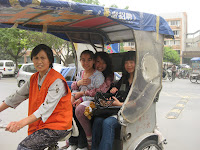
NEWS REPORT, BEIJING, APRIL 23, 2009.
Beijing Police report a small riot broke out among area expatriates in the Haidian District of Beijing last Saturday. Apparently, an American family received a box of what are called “Girl Scout cookies.” These highly addictive substances sent an odor out that quickly spread over a 2 mile area. Crazed Americans began following the scent and quickly descended upon the unprepared campus.
“I’ve never seen anything like it,” reported Wen Ximing, a law student at Renmin. “Americans started running across the square in front of Mingde hall.” Wen followed the group as they quickly converged on the park in front of Building Yiyuan 3, where the Reilly family was holding a picnic that included the addictive substances. “Adults were pushing aside children, trying to grab these small chocolate covered cookies.”
Rick Reilly, a statuesque man with a white beard, shook his head in amazement. Apparently Mr. Reilly has avoided addiction to the cookies. “But my two daughters wept when they received the package. My wife was out of town when it arrived. By the time she returned two days later the cookies were almost depleted.” Reilly accepts that the family made a mistake by allowing the remaining cookies into public view. He apologized deeply and sincerely “for allowing these addictive substances to be out in public.”
Reilly’s wife, Judy, and their daughters Elizabeth (almost 12) and Anna (10) were unavailable for comment. Witnesses report the three Reilly women curled up in fetal positions once the cookies were gone.
The cookies were a gift of the Chivian family of Newton, Massachusetts. Efforts to contact the Chivian family for comment were unsuccessful. The Public Security Bureau is investigating whether Chivians broke any international or domestic laws by sending addictive substances into China. The Chinese government reports that they are also preparing an official complaint to the US Embassy. “We are unsure at this point whether the incident will have any lasting negative effects on Sino-US relations,” stated vice-deputy Wang Jongwen.





























